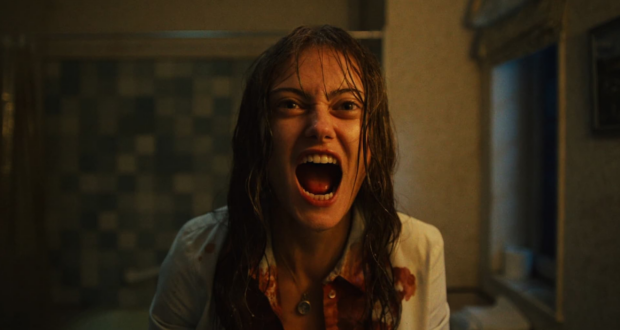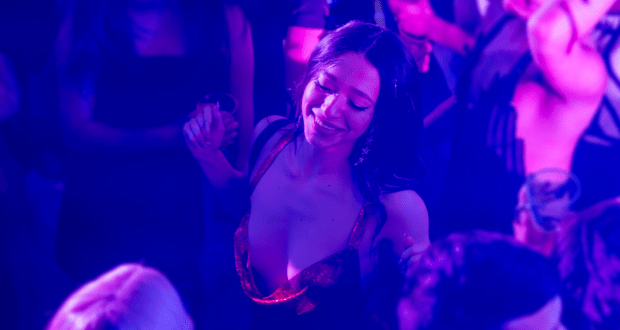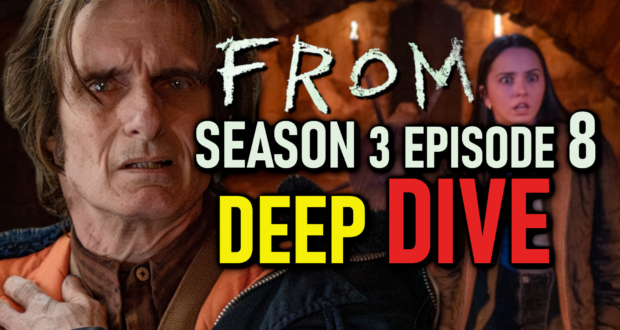In Sweetpea, creator Kirstie Swain masterfully adapts CJ Skuse’s sharp and twisted novel into a gripping dark comedy-drama for Sky Atlantic. Season 1 serves as a devilishly fun ride into the mind of a deeply complex anti-heroine, Rhiannon Lewis, played by the mesmerizing Ella Purnell. The show balances psychological depth with biting humor, all while exploring the messiness of identity, revenge, and suppressed rage.
Premise:
At the center of Sweetpea is Rhiannon, a character as charming as she is disturbing. Purnell’s portrayal is a standout, bringing a wicked blend of vulnerability and ruthlessness to the role. Rhiannon’s life is one of quiet disillusionment, trapped in a cycle of mundane routine as an admin assistant at a local newspaper. Her job is unremarkable, her friendships superficial, and her interactions with people often dripping with contempt—internally, if not always externally. The ordinary trappings of her life only amplify the chaos that simmers beneath the surface, as we gradually learn just how deeply her troubled past, marred by bullying and family turmoil, has shaped her worldview.
Ella Purnell is phenomenal:
Purnell’s performance elevates the series. She navigates Rhiannon’s descent into darker territory with a natural ease, keeping the audience captivated and sometimes uncomfortable as they oscillate between empathy for her pain and alarm at her actions. Rhiannon is not an easy character to like, but she is impossible to ignore. She is both predator and prey—vicious, witty, and deeply human despite her flaws. Purnell finds nuance in the juxtaposition between Rhiannon’s outward apathy and her bubbling inner rage, delivering a performance that’s equal parts chilling and charismatic.
The genius of Sweetpea lies in how it explores the duality of its lead character and, by extension, its tone. On one hand, the show is a deeply dark psychological drama, chronicling Rhiannon’s growing bloodlust and fascination with violence after her father’s death and a fateful encounter with a stranger. On the other hand, it’s a biting black comedy that finds humor in the absurdity of everyday life. The show expertly blends these two opposing tones without either undercutting the other, allowing for moments of both genuine horror and dark laughter.
Wonderful writing:
Swain’s script excels in portraying Rhiannon’s sardonic inner monologue, which is sharp, witty, and often hilarious in its frankness. This voice-over gives us intimate access to her thoughts, allowing us to understand her motivations while also reminding us of her instability. The writing captures the black humor of the source material, offering biting social commentary on the banalities of modern life, all while pulling us deeper into Rhiannon’s psyche.
The show’s pacing is methodical, gradually unraveling Rhiannon’s internal world as external events begin to spiral out of control. The episodes build tension through a series of unpredictable turns, each one further complicating her moral standing. As the stakes rise, we are forced to question how far she’ll go—and how far we’re willing to go along with her.
Supporting cast:
While Sweetpea is undeniably Rhiannon’s story, the supporting cast plays a crucial role in shaping the series’ world. Nicôle Lecky shines as Julia Blenkingsopp, Rhiannon’s childhood bully. Her character is one of the most interesting that the show has to offer throughout its six episodes.
Jon Pointing as Craig, Rhiannon’s lackluster boyfriend, offers a depiction of toxic masculinity so detached it borders on pathetic. His character is oblivious to Rhiannon’s increasingly erratic behavior, adding a layer of tragedy to their dysfunctional relationship. Their interactions are filled with dark humor, highlighting how much Rhiannon hides behind a facade of normalcy.
Calam Lynch’s AJ also contributes to the thematic richness of the show. AJ is a co-worker of Rhiannon’s who has a massive crush on her. But thankfully, it’s never portrayed in an annoying way. While he’s sweet for her, he still wants to focus on his job and put that first. He doesn’t become overbearing ever.
Themes:
Beneath its snarky exterior, Sweetpea grapples with deeper themes of trauma and identity. Rhiannon’s experiences of childhood bullying and family loss are pivotal in shaping her emotional detachment and eventual spiral into darker thoughts. Her father’s death acts as a catalyst, unearthing long-buried feelings of grief and anger that manifest in increasingly violent ways. While her coping mechanisms are extreme, they speak to a broader exploration of how unresolved trauma can lead to dangerous coping behaviors.
The show also deftly explores themes of empowerment, though in a perverse way. Rhiannon finds a twisted sense of control in her darkest impulses, viewing her rage as a form of liberation from the constraints of societal expectations. This raises provocative questions about the line between empowerment and destruction, particularly for a woman navigating a world that has continually failed her. Rhiannon’s actions are cathartic but also disturbing, leaving the audience in a state of moral ambiguity.
Visuals and music:
Visually, Sweetpea maintains a stark contrast between its exterior world of bright, sterile offices and homes and the dark, tumultuous world inside Rhiannon’s head. The direction often juxtaposes the ordinariness of her surroundings with her increasingly violent thoughts, creating a sense of unease. This contrast underscores the tension between her external presentation and internal chaos, making even the most mundane settings feel dangerous.
The show’s use of music also enhances the atmosphere, often employing ironic and upbeat tracks to accompany Rhiannon’s darkest moments. This tonal dissonance further blurs the line between comedy and horror, reinforcing the show’s darkly comedic nature.
Overall:
Sweetpea Season 1 is a compelling, darkly humorous examination of a woman on the edge. It strikes a delicate balance between psychological thriller and pitch-black comedy, never losing sight of its character-driven core. Anchored by Ella Purnell’s magnetic performance, the show offers an intoxicating blend of wit, tension, and moral complexity. With a deft hand, Kirstie Swain has crafted an adaptation that honors the twisted spirit of the novel while carving out a unique voice for itself.
Sweetpea is a bold, audacious series that isn’t afraid to make its audience laugh, gasp, and squirm in equal measure.
-
Acting - 10/10
10/10
-
Cinematography/Visual Effects - 9/10
9/10
-
Plot/Screenplay - 10/10
10/10
-
Setting/Theme - 9.5/10
9.5/10
-
Watchability - 9.5/10
9.5/10
-
Rewatchability - 9/10
9/10


















